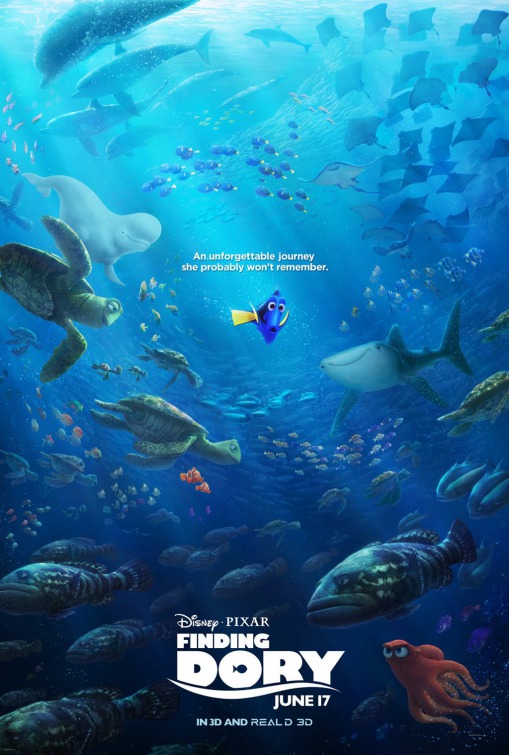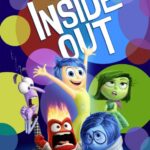An Unforgettable Journey She Probably Won’t Remember
Director
Andrew Stanton
Starring
Ellen DeGeneres
Albert Brooks
Hayden Rolence
Ed O’Neill
Outside of Toy Story, Pixar haven’t had a great deal of luck with sequels. To date we’ve had Cars 2 (a sequel to, frankly, the weakest Pixar release) and Monsters University, which contradicted its own backstory and delivered a lot of bland, neutered college humour. Unless you’re just looking at the income figures (which producers tend to) in which case, Pixar’s sequels have been doing really well and their original properties are now a questionable liability in the face of familiarity and bankable success: hence why, of the next four scheduled releases, only one is an original property. While I will admit that this release is better than the aforementioned sequels and maybe even Toy Story 2, it still doesn’t even come close to its predecessor.
One year after the events of Finding Nemo, Dory regularly attends school with Nemo [Rolence], much to the amusement of the other children. During one particular lesson, migration instincts and family are discussed and Dory is struck by an extremely vivid flashback of her own parents. In a panic, she manages to convince Marlin [Brooks] that she misses her parents but can’t find them by herself. Reluctantly, Marlin agrees to assist Dory, based on the fragments of clues she can piece together. Before long the group arrive at a marine institute in California but are separated. Outside, Marlin and Nemo desperately fear for their friend and do everything they can to get into the institute to save her. Inside, Dory enlists the help of a cantankerous but well-meaning octopus called Hank [O’Neill] who is desperate to be transferred to a permanent exhibit rather than being released back into the wild.
Avoiding the cynicism of toy sale motivation for a second, moving the story to the Californian side of the Pacific (from the Oceania area in the last) introducing us to a host of new breeds – and by extension new characters – was a nice touch. This ensures that even though the film dips into familiar territory of fan favourites, like the seagulls and the turtles, we are still treated to an array of new sights. From disposable additions like the rather terrifying squid to the recurring supports in the form of affable sea lions, a beluga whale and a whale shark, there’s more than enough to guarantee this film has a life and visual personality of its own. If you’re wondering why I haven’t mentioned Hank, it’s because I’m saving most of my thoughts on him for later. But let’s address our lead for a second. I always maintain side characters should often stay in your peripheral view to avoid overloading, like staring at the sun. The second you focus on them too intently, they start to damage your perception of them and aspects that you love quickly become irritating. You only have to look at the disappointing Pirates Of The Caribbean: On Stranger Tides and Minions to see what I mean; not always bad but never up to par. Thankfully, Dory doesn’t fall into that category. While she was essentially a gimmick, the performance and heart behind her character was strong enough to form a connection with the audience. Analysing her past through flashback touches on a lot of ideas about raising children with mental health issues without making it a punchline or essentially “fixing the problem” – a development most animated family films would lazily fall back on. Another sigh of relief that carried over from the conclusion of the last film is the relationship between Dory and Marlin. I can’t express enough how happy I am that at no point did the story angle toward “why are we not pairing up these unaffiliated male and female characters?” I like they see each other as family rather than potential lovers or.. whatever the Pixar-appropriate nautical equivalent would be.
The achievements made in Finding Nemo were truly cutting edge. The visual range of lighting, the deep colour palate, the illusionary depth of field in an essentially flat image, it was wondrous. Finding Dory regrettably loses a lot of originality points but more than makes up for it in technical flair. Building on this established platform, the artists could instead focus on the more perplexing and tricky task of figuring out how to make that octopus move without looking like a solid lump; which they did, beautifully. I’d like to say the same of Thomas Newman’s score but it’s frankly just a bit forgettable. Don’t get me wrong, it’s perfectly serviceable and displays Newman’s signature sound but doesn’t stand out as one of his finest efforts. Which leads me to a bit of an odd point in this critique: several of my most recent reviews have been heaped with praise and yet I have fallen on a middling or sub-par rating. So for a second, I need you to put aside the technical achievements, the endearing characters and the mature mental health subtext and focus on two relatively boring but crucial elements that this film fumbles with: story and purpose.
You can have all the bells and whistles to make a visual spectacle and even all the emotional notes to yank the heartstrings from people’s chests but that doesn’t mean anything cinematically in place of a good story. Dory going on a quest to reconnect with her parents is a positive starting point but it still manages to regurgitate a lot of the perils and pitfalls from the first film, highlighting not only the similarities between the execution for this adventure but basically the plot too. Then we get on to purpose, much like Jason Bourne, we’ve been away from this setting for over a decade and this is the story you come back with? Yeah, it’s rather pleasing but it doesn’t have the weight behind its absence, that bold statement of “boy, have we got a story to tell you!” Instead, we’re given “Hey kids, do you want to know the origins of Dory’s various traits, quirks and catchphrases? ‘Cause we’re going to go through them all like a tick-box exercise.” See, no matter how good the execution, I hate prequels; it’s the inevitability of the film’s conclusion. While Finding Dory isn’t exactly a prequel, it’s so heavily reliant upon flashback that it feels very repetitive. To be honest, this is a bit of a double-edged sword when dealing with someone/something afflicted by short-term memory loss as often the only way to ensure anything sticks is routine, muscle-memory and repetition. But in doing this we are robbed of a modicum of tension in the process. And these aren’t little frustrations but major keys to this film. In the hands of other sequels and lesser studios, we dismiss these issues as “well they clearly don’t know any better, at least they got other elements right.” But Pixar is an A* student, so any time they produce something that ranks a C or a D we can’t help but wonder what happened. How did we get here? Is this a trend or is it just a blip? As mentioned in my intro, this is probably the second strongest sequel (way behind Toy Story 3) in the Pixar oeuvre but coming back to these characters should mean more. Are we going to get a Finding Marlin wherein we go to somewhere like Japan and focus on the dangers of a people who eat a lot of seafood? It feels like there was a chance to give us a very different kind of adventure and regrettably, we kind of got more of the same – albeit limited to the confines of a human-operated marine facility rather than the vastness of the open ocean. Having said all that, much like reviewing a Marvel film or a Tarantino release, Pixar has the benefit of being so much better than most animated family fare and is above and beyond the competition but when drawing a comparison between its own body of work, comes up a little short.
Release Date:
29th July 2016
The Scene To Look Out For:
**Huge spoilers within**
Once Marlin, Nemo and Dory are reunited, she is still intent on finding her parents but quickly realises that they left the institute searching for her, leading her to believe they are in fact dead. Through a series of rushed events, Marlin and Nemo are packed off to an aquarium in Cleveland, Hank bolts to avoid capture and in the process, Dory is jettisoned through a drain and into the sea. Lost, alone, panicked and wracked with guilt, Dory finds herself in the exact same predicament and location she was as a child. Regressing to what she knows, she flounders before trying to calm herself and work through her situation rationally. I stated earlier that while the film may suffer with story and purpose it excels with visuals and emotion. Case in point, Dory being alone again is absolutely crushing but the tears welling up are completely earned. For the first time, we are put in Dory’s shoes, not knowing what to do or how to fix the situation and struck by the very real fear that she may not even remember this incident. It’s a powerful but subtle development (that quickly escalates into the overt emotional development we would expect) that reminds us of the prowess and skill of these storytellers and actually builds on an area that the original missed out on.
Notable Characters:
Based on the various ads and trailers, I couldn’t place the voice used for Hank. Watching the film, it quickly became apparent that Ed O’Neill had been tasked for the role and as any fan of Modern Family can tell you, O’Neill nails the cranky old git with a heart of gold perfectly. Everything about this character is a wonderful addition to the film, from the personality, to the amazing visual effects utilised to bring him to life, to the educational aspects about octopus’ abilities as nefarious escape artists. Random aside, octopuses are one of the highest forms of naturally occurring intelligence and evolutionary design outside of our own which is why I feel bad whenever I eat takoyaki. But I digress. There is, however, a major character flaw with this individual. Throughout the film, we are told that Hank fears the open ocean, he has experienced trauma in the sea and has absolutely no desire to return there. Missing a tentacle, a fear of being touched, not wanting to get emotionally close to people, there’s a clear backstory here that is completely unexplored despite being one of the major aspects of this character’s every motivation. Which makes me really worried they’re simply saving it for yet another sequel. A simple expository scene or two would easily illuminate why this guy is not a fan of the wild but I could imagine producers being sold on “ever wondered why Hank hates the ocean? Well get ready for Finding Hank!”
Highlighted Quote:
“Guys, I found help. Sigourney Weaver’s gonna tell us where we are”
In A Few Words:
“All things considered this could have been so much worse and formulaically speaking everything you could want in a Pixar film is arguably here but thanks to retreading a lot of old ground and a very flimsy premise weakens what could have been a marvelous feature”
Total Score: 3/5
![The Red Right Hand Movie Reviews [Matthew Stogdon]](https://reviews.theredrighthand.co.uk/wp-content/uploads/2021/12/cropped-header1.png)




